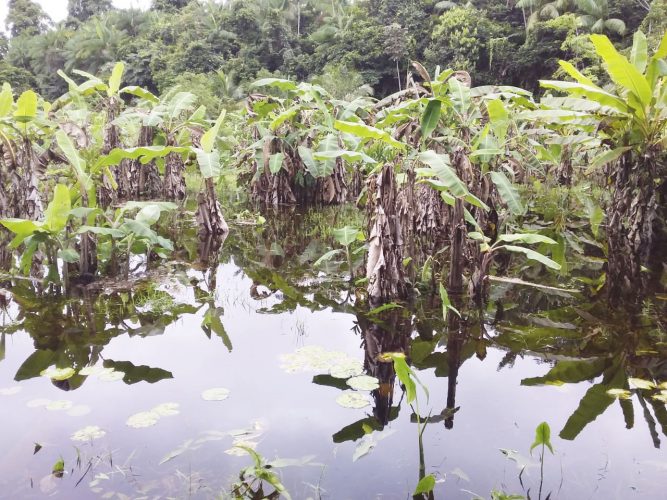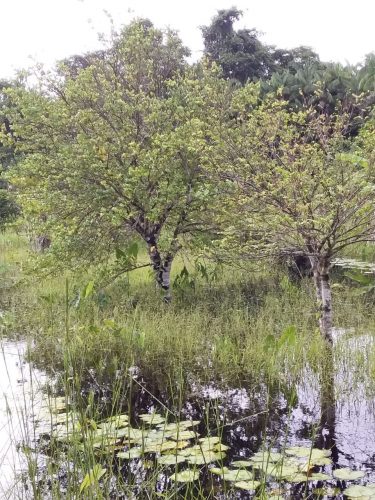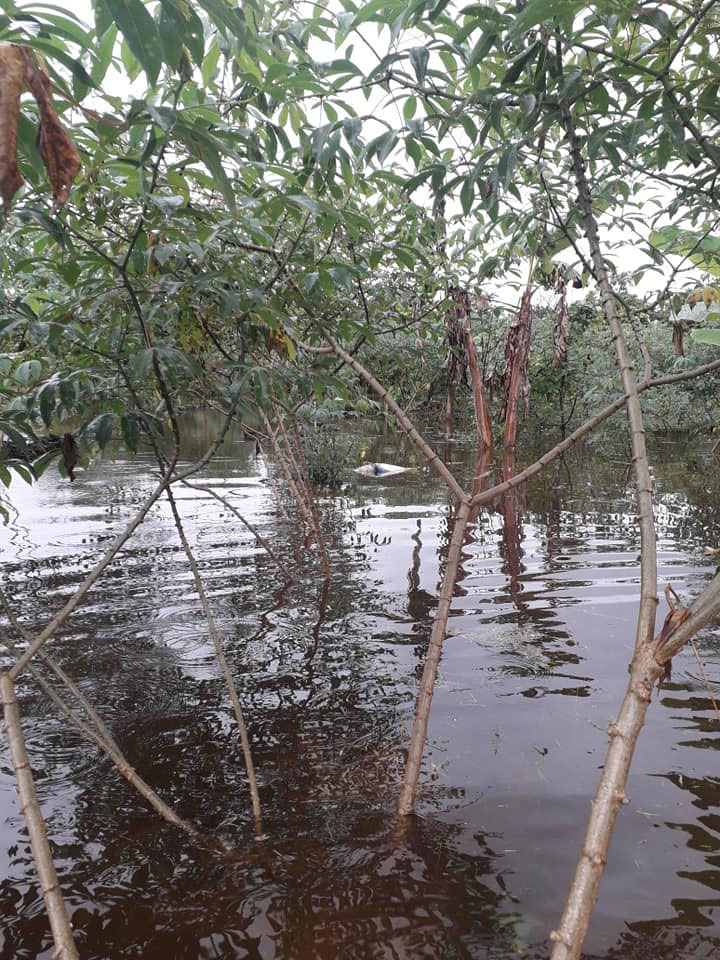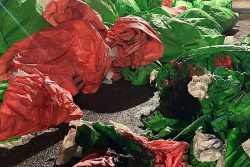Farmlands and homes in the Pomeroon River (Region Two) remain inundated after persistent rainfall and farmers are now worried they will not be able to profit from the current crop.
Floodwaters have been affecting the area for the past two weeks and the accumulated water shows no signs of abating as the rains continue. Reports from the region have confirmed that the entire Pomeroon is waterlogged and sections along the river have varying depths of water.
Communities like Siriki, Karawab, and others in the Upper Pomeroon, and Akawini Creek in the Lower Pomeroon are amongst the hardest hit by the flooding.

“The water come up for like two days now and it is not going down. Before, when the tide fall it does fall but that is not the case now,” Winston Savory, a resident and farmer of Siriki said yesterday.
He explained that at present, water levels in homesteads are approximately two feet high while it is higher in farmlands.
“The backdam water is

rushing down and the river is overtopping so the water has nowhere to go. All of our crops are dying and over 900 avocado pear tree will die because they don’t survive in water. All the leaves are falling off and the pear dropping out and floating,” a worried Savory explained yesterday.
He noted that all of the farmers in the Upper Pomeroon area will face severe losses as they are unable to reap the majority of their crops.
“After this flood we will have to start fresh. We will not get anything left behind. The bananas and plantain suckers are falling down already and the cash crops are dying so we will have to start fresh and we will need help from the government,” he pointed out.
The flood will cause him to lose close to $200,000 from his 20 pear trees and he will have to wait for three years after replanting to reap again.
Savory disclosed that some farmers in his area have also lost livestock in addition to their crops and expressed concern over what will occur when the highest spring tide hits in October.
“We suffer from flooding last year, now again, and when the big spring come we don’t know what will happen. It is not easy to be suffering these losses so steady. We are farmers, we depend on what money we make on this crop to start the next crop but that will not be the situation this crop,” he lamented as he related their plight from his Siriki home.
Another Siriki farmer, Sunita Edwards, whose main produce is cassava, said she has lost her entire crop as the roots are rotting and the young plants are unable to survive the adverse conditions.
“The water so high in the backdam we cannot go to try and reap anything from our farm. Most people crop start to dry up already because the water here for a while on the farms. Is over a week we getting high water,” she informed. Her losses currently are estimated to be over $300,000 with the loss of over 1,000 lbs. of cassava.
According to the farmer, this situation is unlike any she has ever seen even although the community is exposed to frequent flooding.
“The river is high, high, people yards are flooded, water is in people kitchen and downstairs. Some parts the water flow off but when the tide change it is the same situation again,” she pointed out.
During a visit to the communities by regional officials, she said they were given food hampers and they in turn have requested that the region deploy machines to build up existing earthen dams to empolder their farms.
Over at Akawini Creek, the farmers there shared a similar fate as they too pointed out that water levels have been exceedingly high.
Sherily Barker, who resides at the mouth of the creek, yesterday told this newspaper that the water level has been rising where she lives and pointed out that settlements along the banks of the creek are more at risk.
She stated that the water levels there are higher and all the farms have been submerged.
“It is over 3 feet of water we have here and it is higher in the creek. I know many people are suffering because their crops are dying, livestock dying, and the rain is still falling. It fall whole night unto 11 this morning [yesterday],” she related as she explained that dark rainclouds are continuing to over the community.
With water accumulated in the entire community, she said many people are forced to stay indoors to avoid contracting any diseases.
“We will need some bleach and disinfectants because the water is beginning to stink here. It is not really flowing and people livestock are dying so we will need disinfectants to prevent the spread of diseases,” she cautioned.
Another resident, Denecia Naughton, told this newspaper that the water level has risen to just over a foot within the past two days.
She stated that in spite of the rains the water level was relatively low, but in the past two days it has risen.
“We are not flooded but my neighbours are flooded and water went into their house. We had a few chickens and some drowned and we had to move the others higher,” she explained.
Opposition Member of Parliament Shurwayne Holder yesterday told Stabroek News that communities in the lower and upper Pomeroon River are the most affected in the region. He called on government to deploy teams to assess the needs of the communities and offer assistance since the region is heavily dependent on agriculture. He opined that all farmers will need assistance in the post-flooding period to replant for the next crop season.
Regional Executive Officer (REO) of Region Two (Pomeroon/Supenaam), Devanand Ramdatt, along with other regional officials, on Wednesday visited flood-affected communities in the region.
He had stated that the visit was not only to gain a first-hand understanding of the flooding situation, but to assess the needs of families and prepare post-flooding plans.
“We’ve never seen anything like this before. The rate at which the entire Pomeroon was flooded, is something that even the elderly people of Pomeroon are also saying that they’ve never seen anything like this before. Apart from the Pomeroon, two Amerindian communities, Kabakaburi and St. Monica… also received hampers. We’re in the process of securing more hampers,” Ramdatt said on Sunday.










